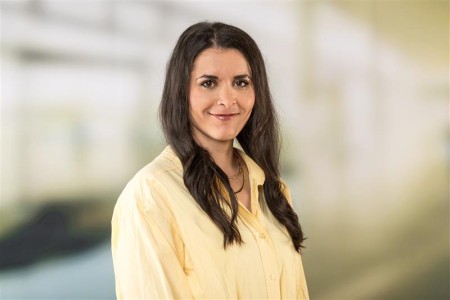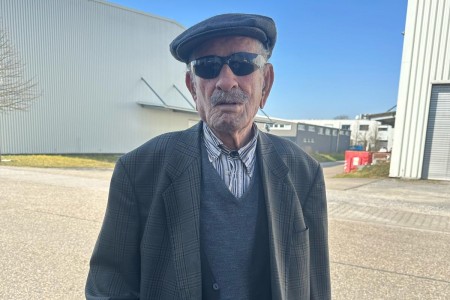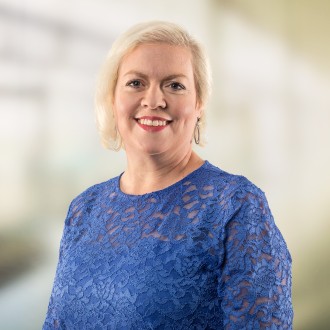People care for people: Care work is more than just childcare
Interview series People&Culture at Messe Karlsruhe - Trade fair employee talks about her everyday life as a carer
When it comes to reconciling work and family life, the first things that come to mind are childcare, parental leave and work-life balance. However, caring for elder relatives in need of care also affects many employees. We in the NEW WORK EVOLUTION team wanted to know what experiences our colleagues have when it comes to work-life balance. Bedriye Siringül, PR Manager in the art karlsruhe market team, is a carer. We asked her how she manages to balance care and work - in addition to her responsibilities as a mother of three children - and what needs to change so that caring older people or sick family members is more recognised. The 41-year-old, who moved to Germany from Turkey at the age of 7, has been working for Messe Karlsruhe since the beginning of 2019.

Bedriye, you have been your grandad's carer for around a year. What does this job involve?
Bedriye: Being a carer is a bit different for everyone, depending on the structure of everyday life and the family. In my case, my grandmother passed away around a year ago. After her death, my mum decided that grandad should move in with her and my dad. However, as my parents are both working themselves and have language barriers, especially when dealing with authorities or medical appointments, I was registered as a carer.
Being a carer simply means taking on another responsibility in life. Especially when someone like my grandpa is still relatively fit at home, it's a lot about organisation: I arrange medical appointments and accompany him to them, I pick up his medication from the pharmacy and take care of communication with the social care centre. Together, we discuss his current state of health and what my grandpa needs.
Does that mean your grandpa has a so-called "Pflegestufe" (i.e. care level)?
Bedriye: He has cPflegestufe 3, which means he is still relatively fit, but you can tell that he is simply not as stable as he used to be. He can stand up by himself, he can go to the toilet by himself, but he finds it difficult to get into a bathtub, for example, or to stand up from a low position, which is why we have a bath seat and a raised toilet seat. These things make his everyday life much easier.
Your grandpa lives in your parents' house. In other words, your parents support your grandpa in everyday life and you take on the tasks that arise outside the home?
Bedriye: Exactly. But when my parents go to Turkey for a few months in the summer, for example, I also take on their tasks. Then I bring him food and make sure he has taken his medication. Basically, you also have to say that we have a very large family and everyone lends a hand, which is perhaps also due to cultural factors. Fortunately, we have a very broad base, but the responsibility for ensuring that everything is organised and done lies with me.
How would you quantify your time commitment?
Bedriye: It's usually ten hours a week, sometimes more, sometimes less. With doctor's appointments in particular, it can quickly add up to more than ten hours - older people have a lot of GP and specialist appointments. I take my grandad's concerns very seriously and don't simply dismiss his complaints or fears - instead, I go straight to the doctor with him. Surgeries are also an issue in old age: preliminary discussions, accompanying him to the surgery and aftercare appointments. All in all, there's a lot involved. And above all, it's not a self-contained task. When one thing is done, the next comes. That's a big part of the mental load.

How do you manage doctor's appointments - they are during the day. Do you have a working model into which you can integrate your care role well?
Bedriye: Of course, I have my fixed working time model with set core hours. But at Messe Karlsruhe, I think we have more flexibility in project management than almost anywhere else. That's a huge advantage, especially when it comes to caring for relatives. And as the work-life balance simply works well in my case, the topic of caring is really easy for me.
When I make doctor's appointments for my grandpa, I simply schedule them on days with few business appointments or on my day off. I also enter these care appointments in my work calendar to create transparency for our team. And, of course, I make up these missing hours elsewhere and still get my work done. This kind of flexibility means that you can simply organise your time as it fits into your life. I can fulfil my private tasks and obligations as well as my professional ones. Nevertheless, the responsibility for ensuring that everything runs smoothly and that the work is done in the best possible way lies with you! So far, I've never been able to say: Oh God, how am I going to make this appointment?
Are there situations where it is still challenging? I'm also thinking of the pre-trade fair period, when part-time employees often work full-time.
Bedriye: When we in the art team have our trade fair in February, I don't make any care appointments that aren't urgent in the time beforehand. If I have an urgent doctor's appointment, I discuss it with my market team. And we not only have support from our own eveent team, but also from the PR department. The collegiality among us is simply exemplary.
Regardless of care work, everyone who works also has a life. Messe Karlsruhe is an employer that places trust in you and also tries to make this topic visible. This is demonstrated by the fact that we are sitting here right now and talking about it.
Not all working people have this kind of flexibility. What needs to be done so that people can better harmonise care work with their career? How can care work be better recognised as part of our family obligations in an ageing society?
Bedriye: Topics such as children and childcare, the compatibility of parenthood and work are very present, but the topic of care is not yet. Awareness needs to be significantly increased: Caring is an extreme additional burden for relatives, both mentally and physically. I don't know why this topic is so little publicised. Perhaps because, apart from associations like the VDK, older people have no lobby. I also once read an interesting article about why older people so often dress in muted colours, that this is probably subliminally related to the fact that they are trying to make themselves less visible. And it is a fact that they are often simply no longer seen once they have retired from work!
But there are old people, and there are increasing numbers of them, and therefore also families who look after them and who also need more visibility. That's what I wish for!
Thank you, dear Bedriye, for these insights!


